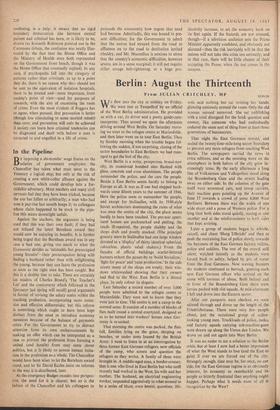In the Pipeline D Y imposing a six-months' wage freeze
on the .1.3 salaries of government employees the Chancellor has taken what must seem to the Treasury a logical step; but only at the risk of creating a new white-collar alliance against the Government, which could develop into a for- midable adversary. Most teachers and many civil servants feel that they have been tricked, because the axe has fallen so arbitrarily; a man who had won a pay-rise last month keeps it; to colleagues whose claim happened to be stuck in the pipe- line this seems downright unfair.
Against the teachers, the argument is being used that this was their own fault; if they had not refused the latest Burnham award they would now be enjoying its benefits. It is further being urged that the Burnham award was in any case a bad one, giving too much to what the Economist derides as 'estimable but preoccupied young females'—their preoccupation being with finding a husband rather than with enlightening the young, because they can leave the profession as soon as the right man has been caught. But this is a shabby line to take. There are certainly (as readers of Charles Brand's 'The Teacher's Lot' and the controversy which followed in the Spectator last spring will recall) good arguments in favour of revising the salary scales within the teaching profession, incorporating more exten- sive and effective differentials; but this reform is something which ought to have been kept distinct from the need to introduce economy measures because of the balance of payments crisis. For the Government to try to distract attention from its own embarrassments by making an offer which can be interpreted as a ruse to prevent the profession from forming a united (and hostile) front may seem clever politics, but it is likely to arouse intense irrita- tion in the profession as a whole. The Chancellor would have been wiser to let the Burnham award stand, and let Sir David Eccles insist on reforms in the way it is distributed, later.
As the emergency Budget recedes into perspec- tive, the need for it is clearer; but so is the failure of the Chancellor and his colleagues to persuade the community how urgent that need had become. Admittedly, this was bound to pre- sent difficulties; for the Government to admit that the nation had strayed from the road to affluence on to the road to destitution invited ribaldry, and Mr. Macmillan is anxious to stress that the country's economic difficulties, however severe, are in a sense marginal; it will not require either savage belt-tightening, or a huge pro- ductivity increase, to set the economy back on its feet again. If the hazards are not stressed, though—if a television audience sees the Prime Minister apparently confident, and obviously not alarmed—then the risk inevitably will be that the unions will not take this crisis too seriously; and in that case, there will be little chance of their accepting the Pause, when the test comes in the autumn.






























 Previous page
Previous page